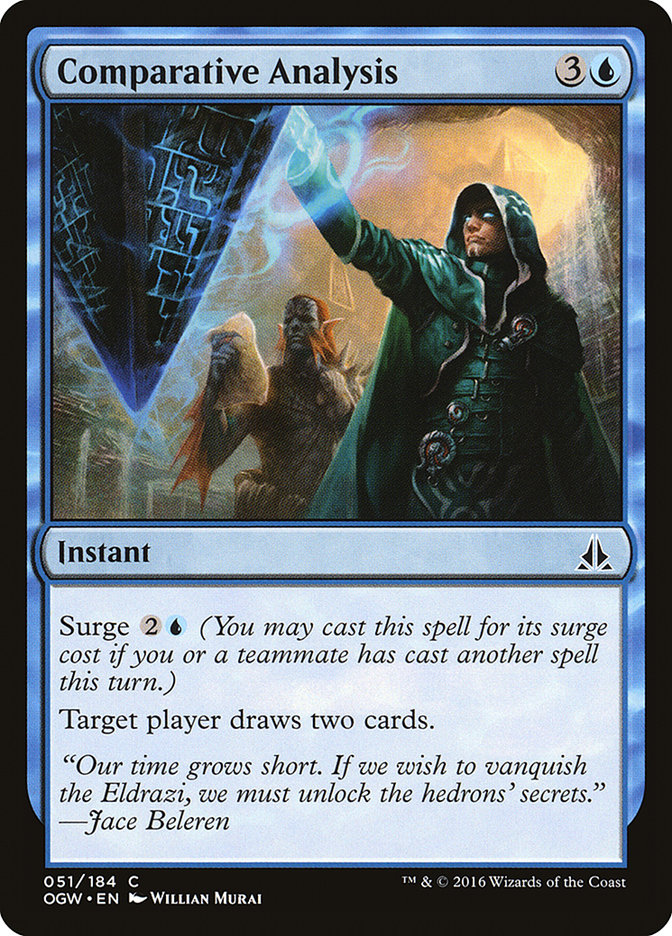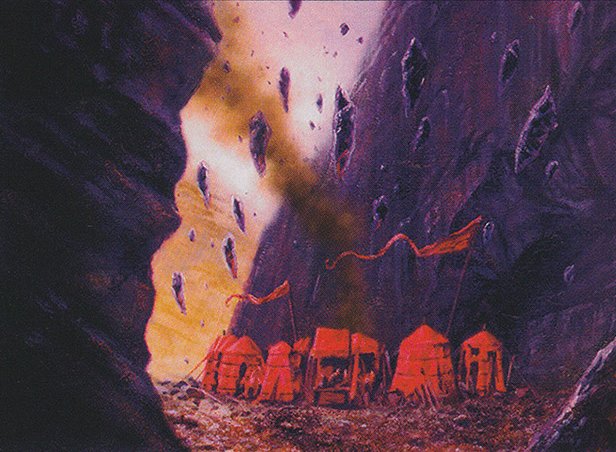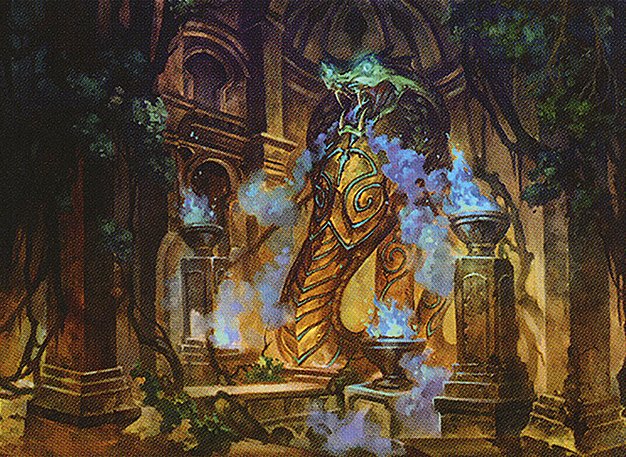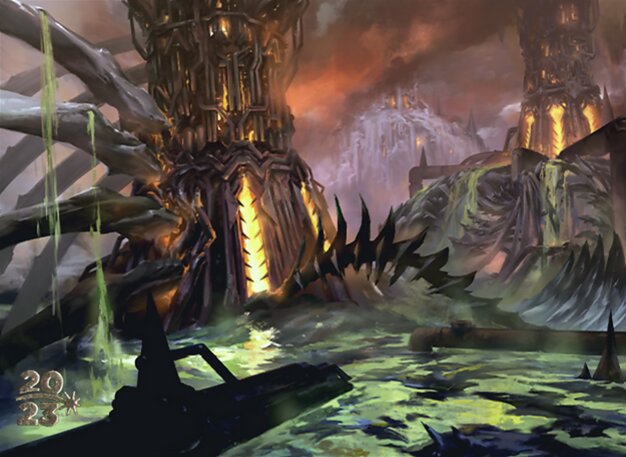Comparative Analysis MTG Card
| Mana cost | |
| Converted mana cost | 4 |
| Rarity | Common |
| Type | Instant |
| Abilities | Surge |
| Released | 2016-01-22 |
| Set symbol | |
| Set name | Oath of the Gatewatch |
| Set code | OGW |
| Number | 51 |
| Frame | 2015 |
| Layout | Normal |
| Border | Black |
| Illustred by | Willian Murai |
Key Takeaways
- Resource acceleration and card advantage often dictate the pace and outcome of MTG matches.
- A card’s instant speed can greatly enhance tactical flexibility and surprise elements in gameplay.
- High mana costs and specific mana requirements may limit a card’s viability across multiple decks.
Text of card
Surge (You may cast this spell for its surge cost if you or a teammate has cast another spell this turn.) Target player draws two cards.
"Our time grows short. If we wish to vanquish the Eldrazi, we must unlock the hedrons' secrets." —Jace Beleren
Card Pros
Card Advantage: In a comparative analysis, a card that grants you access to additional cards has inherent value. This can translate into a greater selection of options, providing you with the tools needed to tactically outmaneuver your opponent. Such a card can be pivotal in swinging the game in your favor through shear volume of resources.
Resource Acceleration: A key element in Magic the Gathering is the ability to outpace your opponent in terms of resources. Therefore, a card that accelerates your mana production or provides alternative resources can significantly enhance your game, allowing you to deploy more threats or answers ahead of schedule.
Instant Speed: Flexibility in gameplay is often a critical factor in claiming victory. A card with instant speed affords you the luxury of reacting to your opponent’s moves. It also keeps your adversaries guessing, reserving the element of surprise to disrupt their strategy during the most opportune moments.
Card Cons
Discard Requirement: Some cards compel players to discard as part of the casting or effect costs. This can be particularly disadvantageous when you’re already at a card disadvantage, potentially setting you back further in the game.
Specific Mana Cost: Cards with a rigid mana requirement, such as needing two blue and one black mana, can be restrictive. They often require a dedicated deck build to efficiently accommodate such costs, which might not always align with your strategy or the flexibility of your mana base.
Comparatively High Mana Cost: Cards that come with a high mana cost need to provide significant value or game-altering effects to justify their inclusion. When comparing these cards to those with lower mana costs and similar effects, they may ultimately be deemed less efficient and find their way out of competitive play.
Reasons to Include in Your Collection
Versatility: Comparative analysis cards serve as a versatile toolkit in a wide array of decks seeking to gain an upper hand through card evaluation. These cards can pivot between offensive and defensive roles, adapting to the ever-changing board state.
Combo Potential: These analytics tools enhance combo decks by optimizing the sequence of plays, increasing your chances of assembling potent combinations efficiently. They often act as the keystone for intricate play sequences that can turn the tide of the game.
Meta-Relevance: In a meta where knowing your opponent’s strategy is crucial, comparative analysis cards provide insight into potential threats and opportunities, allowing for preemptive adjustments to your game plan. Their application in anticipating and responding to commonly played cards makes them a strategic asset in competitive play.
How to beat
Confronting a Comparative Analysis card on the battlefield calls for strategic finesse and knowledge of its mechanisms. Often seen comparing and swapping power, these cards require a direct answer or a way to pivot the game state in your favor. One effective strategy is to employ instant-speed removal or counter spells when the Analysis ability triggers, circumventing the effect entirely before it can alter the course of the match.
Additionally, using card advantage can overpower the Comparative Analysis effect. By cleverly utilizing your own draw spells or abilities to consistently out-resource your opponent, you ensure that the comparative swaps become less impactful. Cards that limit the actions of an opponent or neuter their choices also stand strong against the Comparative Analysis by controlling how and when they can interact with their deck or yours.
Lastly, incorporating graveyard strategies or utilizing cards that capitalize on your opponent’s actions could also turn their Analysis against them. As with any confrontation in MTG, understanding the card’s strengths and limitations is the key to developing a winning strategy against Comparative Analysis cards. Adapt your deck to maintain leverage, and counteract the comparative challenge head on.
Cards like Comparative Analysis
When delving into the details of card comparison in Magic the Gathering, it’s paramount to assess both the nuances and overt strengths of each option. Let’s take a card that serves as a benchmark for comparative analysis — a card that notably influences the board when played. The card we’ll examine stands out not just for its immediate impact but also for its strategic depth in gameplay.
Looking at other cards within the same thematic or functional space, we often find subtle differences that could sway a player’s choice. For instance, a card with a similar effect might require a higher mana cost which, while impactful, could prove less versatile in situations where speed and resource management are crucial. Alternatively, a comparable card might offer a lower cost or additional effects at the expense of requiring specific conditions to be met, thereby limiting its use to certain deck types or strategic approaches.
In summary, the card in question represents a robust choice within its category, balancing cost, effect, and adaptability. While its counterparts may excel in certain aspects, the balanced nature of our focal card provides a consistent performance across diverse game scenarios, making it a solid contender for inclusion in many decks across MTG.
Where to buy
If you're looking to purchase Comparative Analysis MTG card by a specific set like Oath of the Gatewatch, there are several reliable options to consider. One of the primary sources is your local game store, where you can often find booster packs, individual cards, and preconstructed decks from current and some past sets. They often offer the added benefit of a community where you can trade with other players.
For a broader inventory, particularly of older sets, online marketplaces like TCGPlayer, Card Kingdom and Card Market offer extensive selections and allow you to search for cards from specific sets. Larger e-commerce platforms like eBay and Amazon also have listings from various sellers, which can be a good place to look for sealed product and rare finds.
Additionally, Magic’s official site often has a store locator and retailer lists for finding Wizards of the Coast licensed products. Remember to check for authenticity and the condition of the cards when purchasing, especially from individual sellers on larger marketplaces.
Below is a list of some store websites where you can buy the Comparative Analysis and other MTG cards:
- eBay
- TCG Player
- Card Kingdom
- Card Market
- Star City Games
- CoolStuffInc
- MTG Mint Card
- Hareruya
- Troll and Toad
- ABU Games
- Card Hoarder Magic Online
- MTGO Traders Magic Online
See MTG Products
Legalities
Magic the Gathering formats where Comparative Analysis has restrictions
| Format | Legality |
|---|---|
| Commander | Legal |
| Legacy | Legal |
| Paupercommander | Legal |
| Modern | Legal |
| Oathbreaker | Legal |
| Pauper | Legal |
| Vintage | Legal |
| Duel | Legal |
| Pioneer | Legal |
| Penny | Legal |
Rules and information
The reference guide for Magic: The Gathering Comparative Analysis card rulings provides official rulings, any errata issued, as well as a record of all the functional modifications that have occurred.
| Date | Text |
|---|---|
| 2016-01-22 | Casting a spell for its surge cost doesn’t change its mana cost or its converted mana cost. |
| 2016-01-22 | For some cards, surge represents only an alternative cost, a discount that applies if you or a teammate has cast another spell this turn. Other cards, like Reckless Bushwhacker, have additional abilities or effects if you paid the surge cost to cast the spell. |
| 2016-01-22 | If an instant or sorcery spell cast for its surge cost is copied, the copy is also considered to have had its surge cost paid. |
| 2016-01-22 | The other spell that you or a teammate cast can be one that’s resolved, one that was countered, or (for instants with surge) one that’s still on the stack. |









